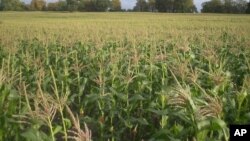After two consecutive seasons of drought, heavy rains finally promise a good harvest in most parts of Zimbabwe’s Manicaland province. But farmers now face a new challenge: washed-out roads that will make it difficult to get their crops to market.
As harvesting time for tobacco, maize and other crops approaches, fears abound that roads made impassable by rain will not be repaired in time.
Some farmers, particularly those growing fruit, already find themselves stuck with produce ready for market but no way to get it there.
"There are no roads. They were washed away by the heavy rains,” said Liberty Kuhudzai, a farmer in Chipendeke, about 70 kilometres south of the city of Mutare.
“We have potatoes which are ready for the market but we can’t take them. And soon, the maize and other crops will be ready for the market too,” he told the Thomson Reuters Foundation.
Chipendeke is one of the most vibrant small-scale farming areas in the province, in far eastern Zimbabwe. Farmers at the moment have potatoes, groundnuts, maize and various vegetables in the ground; in winter they grow wheat, beans, tomatoes and other vegetables.
But their main market is in the city of Mutare, and their farming area is connected to the main Mutare-Masvingo highway by a gravel road that snakes along the treacherous edges of the Chitora River.
Near Chipendeke Primary School, sections of the road are missing after heavy rain. In other areas, bridges are broken or what remains of the roads are muddy and slippery.
“We have tried to repair the roads using our own resources but as soon as we finish the heavy rains come again and wash everything away,” Kuhudzai said. “We don’t even know what to do. Without the road we are stuck.”
LOSING ‘A LOT OF MONEY’
Catherine Nyakunuhwa, a banana farmer in Honde Valley, said the poor state of the roads meant some of her harvest was lost, affecting her business.
“It’s now taking too long for us to reach the market with our bananas and we are losing a lot of money. Right now most of my bananas could not reach the market because they rot before they were ferried,” Nyakunuhwa said.
“We are now appealing to the government to help us repair the roads,” she said, as she sifted through a big basket of rotten bananas to see if any good ones remained. “Farming is our only source of livelihood and we need good roads to take our crops to the market.”
Nyakunuhwa said some farmers have lost more than $100 worth of bananas in a day – a lot of money by local standards.
“It’s a big loss,” she said.
Zimbabwe’s Meteorological Services Department in late February said Manicaland was one the province that has received the heaviest rains – “in some cases record-breaking rainfall,” the agency noted.
The situation has been made worse by Tropical Cyclone Dineo which hit some parts of the country at the end of February.
EFFORTS TO REBUILD
Transport and Infrastructural Development Minister Joram Gumbo said his ministry was working with the Ministry of Local Government, Public Works and National Housing to rehabilitate bad or dangerous roads in both urban and rural areas throughout the country.
Responding to a question from Francis Mukwangwariwa, a member of parliament from Zvimba East constituency, Gumbo said on live television from Parliament earlier this month that the government needed $100 million to rebuild bridges and the road networks.
Mukwangwariwa wanted to know the measures the government had put in place to repair roads and bridges washed away by heavy rain.
“We are now in the tobacco selling season and people need to take their tobacco to the tobacco auction floors,” Mukwangwariwa said.
Gumbo said the Ministry of Finance had set aside $15 million to rebuild roads and was trying to acquire about $50 million in loans through the Zimbabwe National Road Authority.
“This was done considering that farm produce will need to be taken to the market,” he told Parliament.
Gumbo later told journalists in Harare that major bridges had been affected by the heavy rains in a variety of provinces. In some of the areas, farmers and other residents have been using makeshift bridges to cross flooded rivers.
Kuhudzai, the farmer from Chipendeke, however, said he was not convinced that the government would move fast enough to make repairs.
“Do you think the government will start with our road?” Kuhudzai asked. “We pray so because we don’t even know what to do.”
(Reporting by Andrew Mambondiyani; editing by Laurie Goering: Thomson Reuters Foundation)




